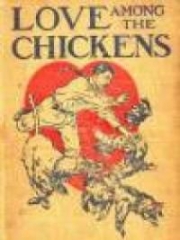 Love Among the Chickens Part 24
Love Among the Chickens Part 24
Somehow we had stopped, as if by agreement, and were facing each other.
There was a look in her eyes I had never seen there before. The twilight hung like a curtain between us and the world. We were alone together in a world of our own.
"It is because I had offended you," I said.
She laughed a high, unnatural laugh.
"I have loved you ever since I first saw you," I said doggedly.
CHAPTER XVIII
UKRIDGE GIVES ME ADVICE
Hours after--or so it seemed to me--we reached the spot at which our ways divided. We stopped, and I felt as if I had been suddenly cast back into the workaday world from some distant and pleasanter planet. I think Phyllis must have felt much the same sensation, for we both became on the instant intensely practical and businesslike.
"But about your father," I said.
"That's the difficulty."
"He won't give us his consent?"
"I'm afraid he wouldn't dream of it."
"You can't persuade him?"
"I can in most things, but not in this. You see, even if nothing had happened, he wouldn't like to lose me just yet, because of Norah."
"Norah?"
"My sister. She's going to be married in October. I wonder if we shall ever be as happy as they will."
"Happy! They will be miserable compared with us. Not that I know who the man is."
"Why, Tom of course. Do you mean to say you really didn't know?"
"Tom! Tom Chase?"
"Of course."
I gasped.
"Well, I'm hanged," I said. "When I think of the torments I've been through because of that wretched man, and all for nothing, I don't know what to say."
"Don't you like Tom?"
"Very much. I always did. But I was awfully jealous of him."
"You weren't! How silly of you."
"Of course I was. He was always about with you, and called you Phyllis, and generally behaved as if you and he were the heroine and hero of a musical comedy, so what else could I think? I heard you singing duets after dinner once. I drew the worst conclusions."
"When was that? What were you doing there?"
"It was shortly after Ukridge had got on your father's nerves, and nipped our acquaintance in the bud. I used to come every night to the hedge opposite your drawing-room window, and brood there by the hour."
"Poor old boy!"
"Hoping to hear you sing. And when you did sing, and he joined in all flat, I used to swear. You'll probably find most of the bark scorched off the tree I leaned against."
"Poor old man! Still, it's all over now, isn't it?"
"And when I was doing my very best to show off before you at tennis, you went away just as I got into form."
"I'm very sorry, but I couldn't know, could I? I though you always played like that."
"I know. I knew you would. It nearly turned my hair white. I didn't see how a girl could ever care for a man who was so bad at tennis."
"One doesn't love a man because he's good at tennis."
"What _does_ a girl see to love in a man?" I inquired abruptly; and paused on the verge of a great discovery.
"Oh, I don't know," she replied, most unsatisfactorily.
And I could draw no views from her.
"But about father," said she. "What _are_ we to do?"
"He objects to me."
"He's perfectly furious with you."
"Blow, blow," I said, "thou winter wind. Thou are not so unkind----"
"He'll never forgive you."
"----As man's ingrat.i.tude. I saved his life. At the risk of my own. Why I believe I've got a legal claim on him. Who ever heard of a man having his life saved, and not being delighted when his preserver wanted to marry his daughter? Your father is striking at the very root of the short-story writer's little earnings. He mustn't be allowed to do it."
"Jerry!"
I started.
"Again!" I said.
"What?"
"Say it again. Do, please. Now."
"Very well. Jerry!"